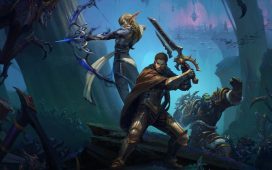Britain and Britishness are somewhat vague concepts. As an island nation our borders are more clearly defined than many, but with England, Wales and Scotland coming under the umbrella of Britain, and many in Northern Ireland considering themselves as British too, it’s still a somewhat muddled cultural grouping.
But it still matters. It’s a culture that has global name recognition, maintains a nuclear submarine fleet, drinks copious cups of tea, backs a state-run health service, supports a royal family, enjoys a curry as much as a sunday roast, runs one of the biggest financial centres in the world, and likes to think it keeps calm in a crisis. For all that divides us, there’s plenty that does not.
And while that culture is regularly depicted and reinforced in film and on TV, depictions of Britain are less common in games. Many games are made in Britain and draw from our culture, such as Fable’s Albion. While some have sections set here, Call of Duty: Modern Warfare for instance. But there are few British-made games that depict, and discuss, British culture directly.
Of those which do, though, there’s an incredible variety. Here we discuss Inkle’s upcoming Pendragon, which retells the Arthurian myth with a hefty dose of modern political critique.
Landlord’s Super, currently in Early Access, depicts Thatcher’s Britain and shines a light on the powerhouse that is immigration.
And we look back to Everybody’s Gone to the Rapture, which depicts a very British apocalypse with a lot to say about our current predicament.
All these games tell us something about British culture today. A culture that is being tested like never before by the pandemic, and which will soon need to take another long hard look at itself as we leave the EU after 47 years.
THE PEN IS MIGHTIER THAN THE… DRAGON?

“Let’s discuss the national psyche,” starts Inkle co-founder Jon Ingold with a mix of glee and foreboding. Politics have long been part of the studio’s output, most notably in 80 Days, a retelling of the Jules Verne classic but with a keen eye for the failings of colonialism. Now Inkle is working on Pendragon, but even in Arthur’s Britain there’s a very modern political message.
“I tend not to start from a political point of view when writing something. I tend to be thinking about the basic stuff: What’s the player doing… what’s the plotline… what’s the mystery?” But it is politics that drive Ingold’s writing: “Some people are really driven by the desire to represent emotion, and as far as I can see emotion is fine, but politics is the interesting thing.
“I used to write a lot of sci-fi before I went into games and the question that always struck me was: If this isn’t about what it’s about, then what is it about?” After all, he explains, we’re not learning anything practical from reading about teleporter accidents, the interesting and relevant parts in sci-fi are found between the lines.
“Pendragon is interesting for me because it’s the first time a project has really started from that sense. And I think that’s because it’s an idea I already had in the back of my mind and had kind of worked out the symbolism of it a long time before the project really materialised.

“We had this game we quite liked, that was completely abstract, and we wanted to bolt a narrative onto it, but we didn’t know what. I had a vague sense that it might be a King Arthur, knights battling sort of thing, and then, as Brexit became clearly something that we were going to do – despite it being stupid – I was reminded of a book by a guy called T H White, which was written in the 1930s, which is a retelling of the Arthurian legend.”
If you‘re not immediately familiar with White’s The Once and Future King, then you will at least have likely encountered the Disneyfied version of its first section: The Sword in the Stone. While Ingold describes the book as “very english, quite silly actually, foppishness and character comedy” he also notes that “it’s really quite serious stuff.”
“It’s written from the perspective of someone who was an intellectual watching the rise of facism in Nazi Germany at the time and seeing this thing just eating the intellectual life in Germany and encroaching on Britain as well.
“White paints Arthur as this figure of justice and honesty who gets undone by his own inability to be just and honest himself, because he’s just a person. Against him is Mordred, who is a complete hypocrite and a total liar. But because Mordred never claims to have any principles, he can’t be outed as a hypocrite, because he never stands for anything, he can be against everyone, and he always kind of comes out intellectually on top.
“And that idea is so visible in the Johnson campaign for Brexit and the way that the government’s been going since then: ‘We’re tired of questioning the reasons why we do things. We don’t want to have to question the reasons why we do things. We just want to do stuff that we think is the right thing to do, and we want no one to answer back.’ It’s the idea that thought and discussion is inherently bad. That Gove line about ‘people are tired of experts,’ which is complete lunacy.
“Arthur is a great symbol because you can reinvent him however you want. He’s just a good person. And whether that’s good because he fights dragons or whether it’s good because he thinks about justice. It depends on who you’re reading really. But that idea of honesty and truth, being defeated by hypocrisy and slander, is very much there in the Arthurian legend.
“And that felt like it really got straight to the heart of what I see happening in Britain at the moment. There’s a group of people who want violence because they can’t be bothered thinking and arguing about things anymore…” As opposed to “a slow progression, done carefully and thoughtfully, with mistakes made along the way.”
“I felt like that really resonated. And that is how we ended up with the particular setting of Pendragon where Camelot has already fallen – that happens in like the first panel of text in the game.” Much like dropping the player in on the morning of the Brexit result, we think.
“When there is no hope of a happy ending, what’s the right thing to do? As a human being in modern day Britain, I have no idea what the answer to that is, as an Arthurian knight I know exactly what to do.” You ride out to fight and quest even though the battle is already lost.
And that is all a very british story, one that could not be set elsewhere, or at least not anywhere: “It links to the myth of Britain, if you set it in the Roman Empire, you can’t tell that story about someone trying to do the right thing and someone else destroying them through hypocrisy.” Because the Roman Empire was a far more logical and bureaucratic time, one based on reason, very unlike the dark ages.
 “The Dark Ages was a time in which nobody really knows anything for certain. There wasn’t such a thing as a map at all, geography was kind of negotiable. Where towns were was dependent on where people said they were, and that could change and no one could write it down… Everything is up for debate and everything is negotiable in that setting because no one can read and there isn’t really a firm truth.”
“The Dark Ages was a time in which nobody really knows anything for certain. There wasn’t such a thing as a map at all, geography was kind of negotiable. Where towns were was dependent on where people said they were, and that could change and no one could write it down… Everything is up for debate and everything is negotiable in that setting because no one can read and there isn’t really a firm truth.”
All of which sounds remarkably like your typical browse through Twitter today, we note.
“Exactly. It’s a world that’s completely at the hands of the minstrels, passing things along [by word of mouth] is exactly what we’ve managed to reinvent for ourselves in a social media context. If we remove the filtration system of a centralised information network, then what we’re left with is just hearsay.”
And now from a Dark Age of polarised debate to an equally stark one of radical change and conflict.
PINT OF LANDLORD’S PLEASE

Rūta Mėlinavičiūtė
of MinskWorks
Greg Pryjmachuk has led a more varied life than many developers: “Before I got into games, I used to work in the concrete industry, I used to do precast concrete slabs and panelling and install them on building sites.”
Which goes some way to explain why developer MinskWorks, which came to prominence through its car-maintenance adventure Jalopy, is now creating Landlord’s Super (think strong beer), an intriguing title in which you get to renovate a rundown bungalow, and eventually let it out to troublesome tenants, all set in Thatcher’s Britain.
“It’s been brewing for a while,” he tells us. “Thematically games are quite stuck in similar places – usually fantasy, sci-fi, military, shooter…” And it’s hard to think of something that sits quite so far away from all that than Landlord’s Super, with its dole office and period-style billboards reading “Grafting ain’t working” in reference to the famous Conservative election campaign of 1978.
We wonder if the homogenous themes of many games are born out of a desire to reach as broad a global market as possible. And whether Pryjmachuk is concerned that his game will have only relatively limited appeal, to those who understand the era?
“I’m not that concerned because we’re lean and mean,” he notes, with MinskWorks having just two permanent staff, with the other being Rūta Mėlinavičiūtė, a 2D and concept artist.
“So a lot of these companies follow these trends because they’re established and proven to be money making. But financially I think we’ll be alright – niches work for us because we get a positive reaction. They open up a lot of opportunities, like this.”
And while everyone needs an audience, Landlord’s Super, quite literally in a way, proves the old adage: build it and they will come. And Pryjmachuk has clear ideas about why he wants to portray this particular period.
“I wanted to get bits of British culture in the game that aren’t seen. Normally it’s like tweed and cups of tea and all that…” And Landlord’s Super’s rundown estate pub and boarded up houses are a long, long way from all that. But the developer also wants to go beyond just a depiction of a white working class.
“I wanted to get stuff like Windrush in there, so there’s a choice at the start of the game where you can choose if you’re from a Windrush family, a descendent. At the moment it only dictates bits of your character, like visual traits, but we’re going to put more into it. You can also choose to play as a displaced person,” a term most often used to describe the huge range of people who ended up in the UK because of World War II, something that’s important to Pryjmachuk personally.
“My granddad was a displaced person. So that’s sort of me. A lot of [British] identity is really immigration based, we need it to survive, I think people seem to forget that, so we’re trying to get that into the game.
 “When I was looking at a lot of the history, how the country rebuilt itself after World War II, a lot of that was [done by] generation Windrush. And then after that came the Thatcher era where we took all those benefits and just got rid of it all.” With the avenues of immigration that had rebuilt the country shut down.
“When I was looking at a lot of the history, how the country rebuilt itself after World War II, a lot of that was [done by] generation Windrush. And then after that came the Thatcher era where we took all those benefits and just got rid of it all.” With the avenues of immigration that had rebuilt the country shut down.
Thatcher’s Britain was tough for many, but as the game depicts it also offered opportunity for those able to take it. And like any recent historical depiction, does Pryjmachuk feel a weight of responsibility to portray things accurately?
“I’m trying to be honest with what I know from my area, growing up in Birmingham,” Pryjmachuk replies. “There is stuff I’m worried about. Like when I was younger, we knew a bricky called Scouse, he was just called Scouse.” And the character and name have made it into the game. “Different people take that differently. All I can do is put it out there and just listen… and then react based on that.”
The game has a lot of humour in it too, to offset its somewhat gritty setting, but also as a realistic part of its depiction. “I think a lot of sarcasm gets missed. Somebody said to me, that no Northerner worth his salt would ever say, ‘Thatcher would be proud.’ But that depends if they were being sarcastic,” he points out.
The game, with its Union Jack logo, is at very least gently ridiculing the nationalism of the Thatcher era, something that’s clearly come around again in the form of Brexit.
“The nationalism thing really does bother me. Last week VE day came about – I’ve never heard of VE day and it’s especially polarising to me because my partner Rūta is Lithuanian, and they’re trying to tell us to celebrate the end of the war, but hang on a minute, the end of the war for her was the start of Communist rule!
“I think more people now are critical of Britain and British culture. Yes, there’s a lot to love, the country is very picturesque, we’re actually quite progressive as well, even though the Tories seem to be in indefinite fucking power.”
And now onto somewhere where the Tories would be in indefinite power, if everyone wasn’t already dead that is, the quintessential English village of Yaughton.
A (NOT SO) EVERYDAY STORY OF COUNTRY FOLK

Chinese Room
Everybody’s Gone to the Rapture’s village setting looks to be exactly the kind of place that Brexit Britain calls home. And while it’s ostensibly the kind of setting that MinskWork’s Pryjmachuk is railing against, developer The Chinese Room uses it as a springboard for some complex social commentary, which is relevant to both the current pandemic and multicultural Britain.
“I always think of games as being a British media,” says Dan Pinchbeck, co-founder of the Chinese Room and the writer of Rapture. “I grew up in the late 70s and early 80s, when games were really in their infancy as a commercial thing, it was all British companies and you had games like Skool Daze and Jet Set Willy, that were so British. So for me it’s kind of weird that it’s become an almost mid- atlantic medium.
That said, he notes that some great titles are still deeply rooted in their creators’ culture: “I absolutely love Metro 2033 and Stalker, and I really love the fact that they’re just saturated in Eastern Europe… I’ve always loved that idea of games where you can really feel they’ve got deep roots in a culture.”
And it’s hard to think of a game that is so obviously and deeply rooted in British culture than Rapture. Both Pinchbeck and studio co-founder and composer Jessica Curry “grew up in villages in England in the 1980s. And there’s something very particular about that experience.”
“We knew we wanted to do something around the idea of a quiet apocalypse. And I’m obsessed with classic British sci-fi: J G Ballard and John Wyndham. They’re so British, they’re not sci-fi that could exist anywhere, it’s so rooted in British culture, and are really interesting as a result.
“The thing I love about Wyndham’s novels is the way British people respond to a catastrophe, which is really pragmatic and matter of fact – the Triffids are kicking around London and people are like ‘oh no the newsagent is closed.’” A theme that continues with the likes of Shaun of the Dead. “A brilliant film, it really sends the British up, but it also celebrates it as well. ‘If we can just make it down the pub, we’ll be alright!’” he laughs.
But it was a more prosaic disaster than man-eating plants or zombie hordes, that in-part inspired Rapture’s cut-off village.
“It was the 1987 storm, so I was 14 I suppose. And in our village trees fell across the two roads coming in and out, and we were just cut off from the world, that was it. That village, with like a couple hundred people who live there, and that was it, there wasn’t a world outside it.
 “I think for Rapture, what’s really interesting is that it alludes to the end of the world, but you don’t really care about anything which happens outside Yaughton. It’s about this little village in the heart of England and what happened there. It just felt like it could only be a game set in England.
“I think for Rapture, what’s really interesting is that it alludes to the end of the world, but you don’t really care about anything which happens outside Yaughton. It’s about this little village in the heart of England and what happened there. It just felt like it could only be a game set in England.
“Not [an apocalypse] with explosions but something that just very quietly happened. It made it a game that was about people looking inwards and looking to each other.”
That’s something that we’ve all experienced up close recently, though the current pandemic is nothing compared to Pinchbeck’s next touchstone: “The other major inspiration of Rapture was the 80s TV movie Threads, which is one of the most traumatic things ever made.” The notorious film shows the impact and aftermath of a nuclear war upon the people of Sheffield.
“There’s people running around blind, because of the nuclear flash, outside Woolworths. It’s horrible because you think, I know these people, I know these places, this makes sense to me because this is my life, it’s not escapism, not a fantasy version of the apocalypse.”
A defining thing for us was saying, in an apocalypse, we wouldn’t be running around in power armour, we’d be one of the little piles of ash on the ground. So what’s the story of that person, what’s the story of the little person who doesn’t get to be the hero? Or what are those small acts of heroism, which I think are really important in any kind of crisis.
“Like the stuff going on right now, heroes aren’t people striding around saving the world, it’s a nurse who doesn’t have the right PPE but is treating a patient anyway. That’s the sort of heroism we wanted to talk about. There are little apocalypses all the time. There are little heroes all the time, and it felt like there’s a game in there. It felt like a very sort of British thing to do really, it just worked in our culture.
“It is weird living through this now, we kind of did capture some of that sort of sense in Rapture. I think we did get the British psyche in the face of a crisis. It feels like the game has got that in it.”
VILLAGE PEOPLE

That said, Rapture isn’t a simple celebration of Britishness, as it also tackles issues of discrimination head-on. “One of the big themes of the game is racism,” Pinchbeck explains. This revolves around Kate, one of the main characters, who is a black American.
“There’s an idea that Kate is a metaphor for the actual alien, people think she’s an alien, because no one’s ever seen a person of colour before and people freaking out in various ways.” While clearly deplorable, such attitudes are complex and it is useful to discuss where they come from.
“Coming at it from Kate’s perspective, these are really awful little people just running around being really mean. And then you get beneath the surface and there’s always reasons why people behave how they do. Even Steven, who’s a really unsympathetic character. He does terrible things. But we want there to be enough in the game to say, this is why he’s ended up the way he has.
“We wanted to make sure that actually there was a proper nuance in all the characters. That there wasn’t caricature. It was really important to us, but the actors get a lot of credit for that as well.
“Susan Brown, who played Wendy – a terrible racist – actually brought this amazing nuance to the character. I think with Brexit, a lot of us have had to deal with family members who’ve got quite radically different politics to us. You end up thinking: I really love you, but I really, really have a problem with this world view that you’ve got.
And that world view is born in large part out of the parochial setting. And to recreate that setting the team turned to voice talent with a huge experience of village life.
“I think half the cast were from The Archers, which is brilliant.” The game’s design very much makes it an interactive radio play, and for the recordings the developer very much treated it as such. “We wanted them to treat this like it is an extended episode of The Archers and not even think about the game side of it.
“[Rapture] has got that real stiff upper lip thing going on. And you really have to peel back the layers to understand the characters properly. And that really appeals to me in terms of it being, again, a British approach to drama.”
GOD SAVE OUR GAMES
It takes quite a while to make a game, so they are rarely the first out of the gate when it comes to reacting to events such as the current pandemic.
However, as shown here, longer-term trends, such as Brexit, the change of tone in our politics, and racial prejudice, are (sadly) here for the long term and all three of the titles discussed here (and many more) are making important statements about our outlook to such issues, statements that can be experienced by gamers in the UK and around the world.
In an increasingly globalised world, there will always be a temptation to create work that can resonate with as wide an audience as possible. However, work that is grounded in something familiar and important to us, can through its authenticity punch well above its weight and carry our outlook on Britain’s future beyond these shores.
Brittania may not rule the waves anymore, thankfully, but it’s still an incredibly rich cultural touchstone which its game creators should use more often to empower their games with context and meaning.













